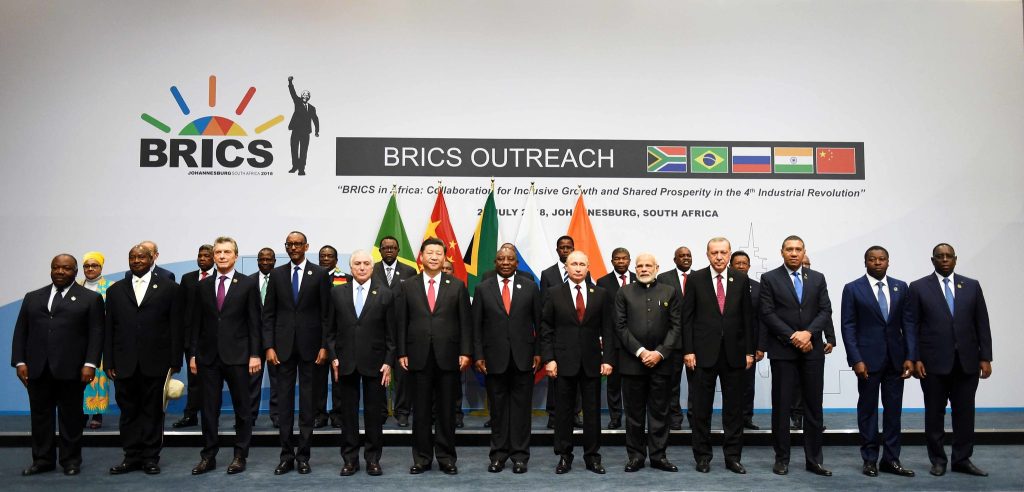From 22 to 24 August 2023, South Africa will host the 15th annual summit of BRICS, a group of five countries comprising Brazil, Russia, India, China, and South Africa.
The group, whose original agenda when it was formed in 2010 was to enhance political and economic cooperation among its members, is increasingly challenging America’s dominance in global affairs.
Something else BRICS seems to have a big problem with, and which it has promised to challenge in earnest, is the centrality of the U.S. dollar in the global financial system.
According to its leadership, BRICS desires to make the global governance system ‘fairer and counterbalance the dominance of Western countries. It is expected that some of the things that BRICS will discuss in South Africa during the summit that will run from August 22-24 include the introduction of a common currency.
This development has sparked growing debate around the world’s future as far as governance is concerned.
Some argue that the fall of the U.S. and its dollar is inevitable and that America will not dominate the world again if BRICS lives up to its plans. Others have dismissed the eventual replacement of the U.S. dollar with BRICS currency as a premature promise that would not shake the world order as we know it.
BRICS vs. U.S. Dollar: A New Currency Showdown?
It would be a fatal mistake to write off the BRICS project too soon. Brazil, Russia, India, China, and South Africa have a combined nominal GDP of at least US$28.06 trillion, a total GDP of more than US$ 56.65 trillion (which represents 32.5% of global GDP PPP), and over US$ 4.46 trillion combined foreign reserves.
It would be interesting, though, to see if the anticipated BRICS currency can actually challenge the U.S. dollar, whose historical dominance of the global financial system has some deep roots.
We have been here. The Euro, which was launched in 2001, was designed to create a potent rival to the U.S. dollar, give Europe a sense of identity and enhance its role on the world stage.
Today, more than 318 million people in 20 countries are using the Euro, a relative success that has made people argue that since Europe is arguably equal to the U.S. in economic output and trade, why should it not be America’s equal in monetary matters, too? The fact is Europe has failed to match America’s monetary strength because the U.S. dollar still runs the global economy with nearly 11 percent of global trade and 15 percent of global GDP on a purchasing power parity basis.
Until 1925, the British pound was the most powerful currency in the world. Well, until the Second World War happened. Britain may have won the war, but it lost its economic influence in the process.
The pound steadily lost its strength and dominance, while on the other side of the world, the U.S. dollar gained tremendous strength and influence, ultimately becoming the most important currency in the world.
If you study the global financial system closely, you will realize that there is a unique balance between the U.S. economy and the influence of its dollar in the world economy.
Dollar’s Dominance: From Sterling’s Fall to China’s Rise and U.S. Challenges in 2023
You will notice that apart from being the domestic currency of the U.S., the dollar is also the dominant currency in the entire global economy: it is the common currency used in global payments and foreign exchange transactions.
Before the dollar gained the power that it wields today, the sterling pound was the big thing. It was the only international currency used in the pricing of trade and the denomination of international bank loans and bond issuance.
These characteristics of the sterling pound were closely related to the dominant role of Great Britain in international trade and finance in the late 19th and early 20th centuries.
However, by the late 1920s, the U.S. had also gained prominence as an international financial center, as 55 percent of all foreign bond issues were denominated in U.S. dollars and launched in its New York financial district.
That being said, there are emerging legitimate questions about the durability of the U.S.’s leading role in the global economy and the global currency power of the dollar.
These questions are related to uncertainties about the strength of domestic political support for America’s global financial role and the impact of China’s growing geo-economic influence on the global economy.
Some have already written off the dollar, announcing that it may well be on its deathbed. Others have expressed optimism that the dollar will remain the dominant global currency for the foreseeable future.
After seemingly losing its hegemony from China’s growing influence, the U.S. is on the road to losing its economic might too. Well, 2023 has been a tough year for virtually all economies worldwide. In the U.S., the shock banking crisis was heralded by the fall of Silicon Valley Bank in March.
Two months later, several regional banks, including Los Angeles-based PacWest and Arizona’s Western Alliance, had their shares suspended, driving fear that we could be headed to a global financial crisis similar to the one we experienced in 2008, if not worse.
At some point, there were speculations in the media that the U.S. government was running out of money – it had just US$88 billion as of May 10th.
The U.S., the largest economy in the world with a GDP of more than $25,854 billion, is in a dark, desperate hole. But so are many economies across the world, including China and Russia. How it will respond to the BRICS challenge is a show we all have – nay, must – watch.
Read more politics insights here.

